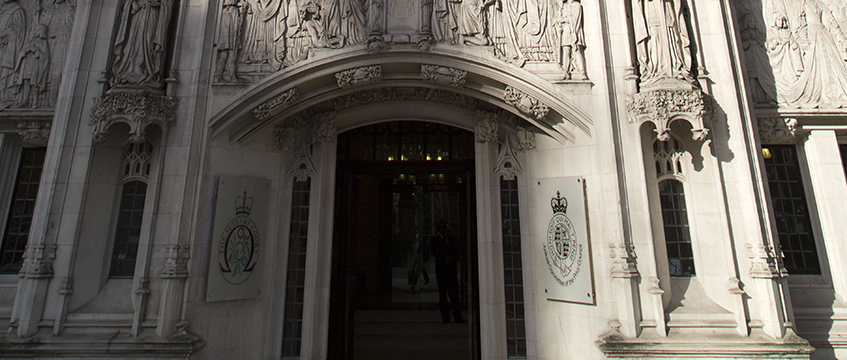Road Traffic – Traffic regulation order – Mechanically propelled vehicles – Claimant challenging defendant local authority’s decision to make traffic regulation order prohibiting use of unclassified rural roads by mechanically propelled vehicles – Whether fatal that statement of reasons not expressly referring to or considering duty and factors in section 122 of Road Traffic Regulation Act 1984 – Application dismissed
The defendant, which was both the traffic and highway authority, made a traffic regulation order under section 1 of the Road Traffic Regulation Act 1984 (the 1984 Act) which prohibited the use of three linked rural “green lanes” in Hampshire by mechanically propelled vehicles. The roads, which linked tarmacked public highways, had been used by four- and two-wheeled vehicles, and were in poor repair. They were unclassified roads which, although appearing on the defendant’s list of streets under section 36 of the Highways Act 1980, were not recorded on its definitive map and statement. The claimant was a national organisation which aimed to preserve the full status of vehicular green lanes and the rights of motorcyclists to use them. It had a code of conduct and its members were expected to maintain high standards of behaviour. It applied to quash the order.
Section 122 of the 1984 Act provided that it was the duty of every strategic highways company and local authority so to exercise the functions conferred on them by the Act as to secure the expeditious, convenient and safe movement of vehicular and other traffic (including pedestrians) and the provision of suitable and adequate parking facilities on and off the highway having regard to: the desirability of securing and maintaining reasonable access to premises; the effect on the amenities of any locality affected and the importance of regulating and restricting the use of roads by heavy commercial vehicles, so as to preserve or improve the amenities of the areas through which the roads ran; the national air quality strategy prepared under section 80 of the Environment Act 1995; the importance of facilitating the passage of public service vehicles and securing the safety and convenience of persons using or desiring to use such vehicles; and any other relevant matters.
The claimant argued, amongst other things, that the statement of reasons failed to identify a statutory purpose or to refer to the factors in section 122, the officer’s report was misleading as it did not mention the response of the road policing unit (RPU), and the report was irrational for recommending a total motor vehicle ban and rejecting the idea of a permit system for responsible users.
Held: The application was dismissed.
(1) The duty in section 122(1) was a qualified duty, against which had to be balanced the factors in section 122(2), such as the effect on the amenities of the area and, in the context of making a traffic regulation order, the purposes identified in section 1(1). As a matter of law, the duty of securing the expeditious, convenient and safe movement of vehicle and other traffic (including pedestrians) was not given primacy. The issue was whether in substance the section 122 duty had been performed, and the balancing exercise conducted, not whether section 122 was expressly mentioned or considered. In the particular circumstances of a case, compliance with the section 122 duty might be evident from the decision itself, or an inference to that effect might be drawn since the decision had been taken by a specialist committee or officer who could be taken to have knowledge of the relevant statutory powers: Williams v Waltham Forest London Borough Council [2015] EWHC 3907 and Trail Riders Fellowship v Devon County Council [2013] EWHC 2104 (Admin); [2013] PLSCS 203 applied. Williams v Devon County Council [2015] EWHC 568 (Admin) not followed.
(2) The statement of reasons given fitted the statutory purposes at section 1(1)(a)-(d) of the 1984 Act. At the outset, the statement referred to the object of preventing damage caused by vehicles, which made the lanes dangerous and almost impossible to use safely, which brought in section 1(1)(a)-(b). The second paragraph of the statement referred to difficulties for access and to the lanes being used for trespass, which took in section 1(1)(c)-(d). It was obvious that the defendant was satisfied that the order was expedient for a statutory purpose; and that it was made for one or more of the statutory purposes.
(3) It was not fatal to the defendant’s decision that it had not expressly referred to or considered section 122. The issue was whether the duty was satisfied in substance. The decision-maker had expertise in town planning and highways, and the statement of reasons in substance complied with section 122. The decision referred to pedestrians, access, amenity effects and safety. In several places there was an express acknowledgment that a balance needed to be struck. The section 122 duty was in substance fulfilled.
(4) The statement of reasons set out the statutory purpose for which the order was to be made and addressed section 122. In the context of the consultation, it was adequate to identify the reasons for proposing the order and enabling the consultees to make informed responses. The claimant and some of the other consultees, the police and the neighbouring landowners were sophisticated and knowledgeable about the issues at play behind the making of the order. The claimant made the point that the decision relied on noise nuisance whereas the statement of reasons made no reference to that factor. Consequently, no member of the public would have appreciated that it was an issue. However, noise nuisance had been raised on a number of occasions by different parties. In any event, the claimant was not substantially prejudiced. It understood the nature of the proposal; it did object, at length; and it provided grounds for its objection. Along the same lines, there was no basis to a claim that there was procedural unfairness.
(5) The RPU response had been muddle-headed and wrong, and it was unsurprising that the officer’s report had not mentioned it. The local police had supported the order. While the report should have mentioned the RPU response and pointed out its inadequacies, it was not so obviously material as to be a relevant consideration.
(6) The irrationality hurdle had not been surmounted. The order had been supported by other local groups, local police, adjacent landowners, the county councillor and most consultees. It had been extensively considered over several years and the defendant had considered, but rejected, a permit system on the basis that only a total ban would be effective.
Adrian Pay (instructed by Brian Chase Coles of Basingstoke) appeared for the claimant; Stephen Whale (instructed by Hampshire Legal Services) appeared for the defendant.
Eileen O’Grady, barrister
Click here to read a transcript of Trail Riders Fellowship v Hampshire County Council










